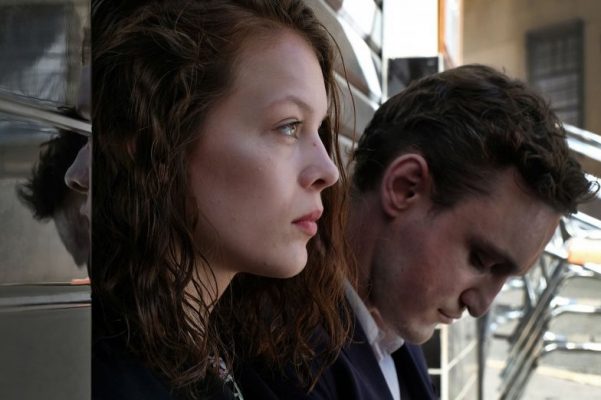Cinema is a mediating medium. It occupies a space between the meeting of drama and narrative, literature and photography, representations of reality and the abstractions of fantasy. The inbetweenness of cinema is caught, enlarged, and made both woundingly beautiful and politically terrifying in Christian Petzold’s Transit, the director’s new film which begins with Georg (Franz Rogowski) escaping from a Paris taken over by a fascist insurgence. Before fleeing, Georg is asked by a friend to deliver a pair of letters to a leftist writer, Franz Weidel — but Georg finds that the writer has killed himself. Georg takes the letters, Weidel’s papers, and his last manuscript, and travels to Marseille with a mortally wounded friend.
The friend dies en route, leaving Georg to seek his family (Melissa (Maryam Zaree) and her son Driss (Lilien Batman)) out and inform them, befriending them in the process. When he arrives in the port city, the first of the film’s spectacular coincidences occurs: Marie (Paula Beer) sees Georg from behind, runs towards him, taps him on the shoulder, thinking he’s the husband for whom she’s been tirelessly searching. Her icy, insomniac eyes are saddened by this mistake, and she flees — unbeknownst to her, she has just mistaken the man who will assume her husband’s identity for the husband himself, Weidel. Over the course of more accidental encounters, Georg slowly falls for Marie, but there’s an impossible obstacle: as he goes around the Mexican and American consulates looking to confirm passage — a “transit” — out of France, Marie hears of sightings of her husband, who she will not leave without, and continues looking.
This is only one of the doubles in Transit, a film obsessed and fascinated with doubling and haunting. Here’s another: the film appears to be set in present-day France, the cars and shop fronts are contemporary, the fascists wear modern police riot gear; but the passports are creased pamphlets, typewriters are the means of composition. This is clearly the story of the Nazi invasion of France, the attempt of Jews to emigrate and, as Melissa and Driss open up, it’s also the story of today’s refugee crisis in reverse.
Complicating matters further, in a textual sense, is the film’s narrator. In Anna Seghers’s novel from which the film is adapted, the narration is a consistent first-person. Petzold has made an elusive alteration here, which makes Transit both harder and richer to follow. Perspective has shifted to an (at first) anonymous source from within the world of the film itself. The other matter is tense. He speaks in a past pluperfect (“He had”) which clarifies nothing; the narration is full of over-elaborate, self-consciously literary remarks which act as embellishments for the story the camera is presenting, in its own, plain way.
And the film’s plain visual style serves it well — the flatness of the compositions complements the bureaucratic lack of nuance some characters exhibit; yet the film’s appearance doesn’t cancel out emotions but rather encourages them in surprising ways: revealing two-shots, for instance, emphasise moments of connection in unlikely circumstances; and Hans Fromm’s cinematography is attentive to the distance between the camera and its subject — shots in which the separation is more marked than previously have a feeling of desolation, a sense of abandonment to them.
The performances are exhausted and plaintive, as in Petzold’s previous films Barbara and Phoenix, the protagonists wearied by the looping, Kafka-like trap they find themselves in. Georg, as made flesh by Rogowski, has the animating goodness of the displaced person, and the despondent delivery of his line-readings accentuates a clever trick in Petzold’s script: his every utterance is a double-speak, he’s usually correct, but so long as he’s in the guise of Weidel, it doesn’t matter. The impossibility of truth-telling in a world of both profound and expedient lies, then as now. How can anything be known when human life and language is this devalued? And seeing the present, as Transit seems to understand, is a matter of knowing the past.
At Filmhouse, Edinburgh until Thurs 22 Aug 2019
